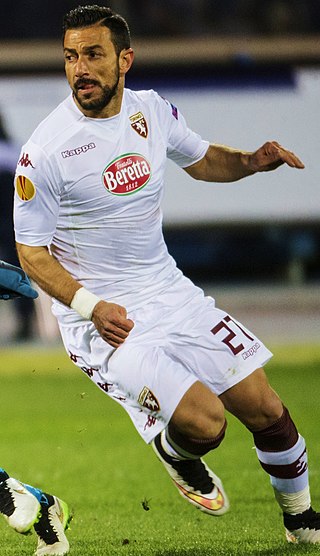
Fabio Quagliarella is an Italian former professional footballer who played as a forward.
In 1992–93, the Serie A title was retained by Milan, who finished four points ahead of Internazionale. Third placed Parma enjoyed European glory in the European Cup Winners Cup, while unfancied Cagliari crept into the UEFA Cup qualification places at the expense of the 1991 champions and 1992 European Cup finalists Sampdoria. Roma and Napoli finished mid table after disappointing campaigns, while Brescia, Fiorentina, Ancona and Pescara were all relegated.
The 1987–88 Serie A was won by Milan.
Nicola Amoruso is a former Italian footballer who played as a striker. An elegant, technically gifted, and agile forward, known for his delicate touch on the ball and use of feints, he usually played in a central role; his nicknames were piede caldo and Dinamite (Dynamite), due to his eye for goal. He is currently the sporting director of Palermo.

The 2007–08 season was Football Club Internazionale Milano's 99th in existence and 92nd consecutive season in the top flight of Italian football. This season marked Inter's centenary celebration on March 9, 2008. The club commemorated its foundation on the previous day with a party in San Siro, in which supporters and former players took part.
The 2007–08 season was Juventus Football Club's 110th in existence and first season back in the top flight of Italian football.
Juventus Football Club finished second in Serie A and reached the final of the Coppa Italia in this season.
Juventus Football Club did not manage to win the domestic championship for the seventh year in succession, but the legacy of the season was saved when it beat Borussia Dortmund by 3–1 away from home, then 3–0 in Turin, to clinch the 1992–93 edition of the UEFA Cup.
SSC Napoli got extremely close to a shock relegation to Serie B, and only held on to its top-flight status by two points. This was just three years since the club led by playmaker and legend Diego Maradona won the domestic league title. It actually spent Christmas of 1992 in the relegation zone, and climbed out of it thanks to a strong January '93 run. The reason Napoli survived was the above-average offensive skills. Gianfranco Zola, Daniel Fonseca and Careca was a trio capable of leading any teams' attack, and the club looked set to suffer when Zola (Parma) and Careca (Japan) departed at the end of the season. Fonseca's season is mostly remembered for an extremely unusual five goals in one match, as Napoli beat Valencia 5-1 away from home in the UEFA Cup. Then it lost to Paris SG in the next round, rendering it was out of Europe.
In the 1995-96 S.S.C. Napoli season, the club finished in the lower midfield of the table, once again missing out on the international competitions. Goalscoring was at a premium, but the tight defence led by Latin Americans Roberto Ayala and André Cruz, ensured that Napoli did not go close to relegation. Goalkeeper Giuseppe Taglialatela also strengthened his reputation with a solid season.
Torino Calcio had a solid season, in which it earned a new contract as a newcomer. The most appreciated player in the squad was right-winger Antonino Asta, who got a late breakthrough at the age of 31, and proved to be the key player as the club stayed above the drop zone by just four points. Marco Ferrante returned from Inter, and scored ten goals, a career best for the experienced striker. The squad also featured the highly rated Swedish striker Yksel Osmanovski, a very young future Italian national team striker in Fabio Quagliarella, and the Turin legend, defender Stefano Fattori.
During the 1986–87 season, Milan Associazione Calcio competed in Serie A and Coppa Italia.
Piacenza Calcio did not manage to renew their stay in Serie A, in the club's debut season at the top level of Italian football. The performance from the team was not too poor however, considering it was only a point from the 14th place that would have kept Piacenza up.
Juventus Football Club finished the season second in Serie A. They also reached the semi-finals of Coppa Italia and the Cup Winners' Cup. It was the only season without trophies for Giovanni Trapattoni.
The 2013–14 Serie A was the 112th season of top-tier Italian football, the 82nd in a round-robin tournament, and the 4th since its organization under a league committee separate from Serie B. The season began on 24 August 2013 and concluded on 18 May 2014. As in previous years, Nike provided the official ball for all matches with a new Nike Incyte model used throughout the season. Juventus were the defending champions, and successfully defended their title to win a third Serie A title in a row with a record-breaking 102 points.
The 2013–14 season was Football Club Internazionale Milano's 105th in existence and 98th consecutive season in the top flight of Italian football. The team competed in Serie A and the Coppa Italia, finishing fifth in the league and qualifying for the 2014–15 UEFA Europa League.
The 2014–15 season was Atalanta Bergamasca Calcio's fourth consecutive season in Serie A after having been relegated to Serie B at the end of the 2009–10 season.
During the 1995–96 season Atalanta Bergamasca Calcio competed in Serie A and Coppa Italia.
During the 1986–1987 season Associazione Calcio Fiorentina competed in Serie A, Coppa Italia and UEFA Cup.


